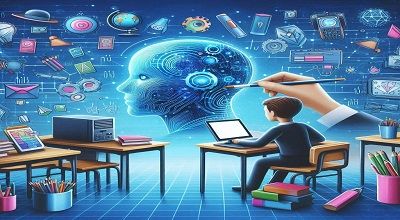Exploring the Impact of AI Tools in Education
The impact of AI tools in education, specifically focusing on AI detection and AI generation, is substantial and transformative. Both AI detection and AI generation technologies have the potential to enhance various aspects of the educational experience, from personalized learning to efficient assessment. Let’s explore each aspect:
AI Detection in Education
Automated Grading and Assessment:
- AI detection tools can efficiently grade assignments, quizzes, and exams, saving educators time and providing quick feedback to students.
- These tools can identify patterns in student responses, helping to assess understanding and proficiency in different subjects.
Plagiarism Detection:
- AI-powered plagiarism detection tools can scan and compare student work against a vast database of academic content to identify instances of plagiarism.
- This helps maintain academic integrity and encourages original thinking among students.
Behavioral Analytics:
- AI systems can analyze student behavior in online learning environments, identifying patterns that might indicate engagement levels, areas of struggle, or the need for additional support.
- Educators can use this information to tailor their teaching methods to better meet the needs of individual students.
Adaptive Learning:
- AI detection can be used to track individual student progress and adapt learning materials based on their strengths and weaknesses.
- This personalization can lead to a more effective and engaging learning experience for each student.
AI Generation in Education
Content Creation:
- AI generation tools can create educational content, ranging from lesson plans and quizzes to interactive simulations.
- This can assist educators in developing high-quality materials, especially in subjects where up-to-date information is crucial.
Language Translation:
- AI language generation can facilitate language learning by providing accurate and contextually relevant translations.
- This helps students understand and communicate in multiple languages, fostering a more inclusive learning environment.
Tutoring and Homework Assistance:
- AI-powered virtual tutors can provide personalized assistance to students, answering questions, explaining concepts, and offering additional practice problems.
- This can be particularly beneficial for students who need extra support outside of regular class hours.
Creativity Enhancement:
- AI generation tools can encourage creativity by assisting students in generating ideas for projects, essays, or other assignments.
- This can foster a more dynamic and innovative learning atmosphere.
Considerations and Challenges
Ethical Concerns:
- Both AI detection and AI generation raise ethical considerations, such as privacy issues, bias in algorithms, and the potential for over-reliance on technology.
Teacher Training:
- Educators need proper training to effectively integrate AI tools into their teaching methods and to interpret the insights provided by these technologies.
Balancing Automation and Human Interaction:
- While AI tools can automate certain tasks, maintaining a balance between automation and human interaction is crucial to preserve the essential elements of the teacher-student relationship.
Conclusion
In conclusion, the impact of AI tools in education is multifaceted, offering opportunities for efficiency, personalization, and innovation. The successful integration of AI tools requires careful consideration of ethical implications and ongoing support for educators to leverage these technologies effectively.
